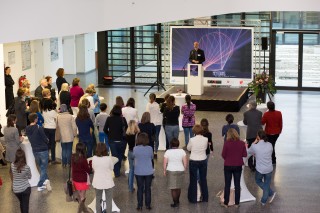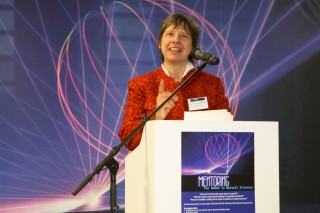Kick-off-event with pink champagne: Speakers from Universität Hamburg and DESY emphasize the importance of “Mentoring for Women in Natural Sciences”. The new program started on 14 April 2015.
„I am very happy, that we are here to start this program“, Prof. Heinrich Graener, Dean of the Faculty of Mathematics, Informatics and Natural Sciences, addressed the audience at the kick-off-event for “Mentoring for Women in Natural Sciences” in the CFEL foyer. It took him just a few figures to underline the importance of the project jointly organized by CUI, DESY, SFB 676, SFB 925, and the PIER Helmholtz Graduate School: 25% of the applications for a job in natural sciences come from female scientists; after the selection process 25% of the jobs go to female scientists. So in order to increase the number of female scientist on all levels of excellent research, it is necessary to increase the number of women who pursue their scientific career, he said.

„There is a change of thinking“, Prof. Christian Stegmann, member of the DESY Directorate, said. Credit: Marta Mayer, DESY
„There is a change of thinking“, Prof. Christian Stegmann, member of the DESY Directorate, added. Even before the Helmholtz Association decided upon a quota, DESY had already introduced it. Stegmann: „We want to have equal chances for women and men.” Although DESY already offers flexible models to increase the number of women – in order not to lose the enormous potential of creative brains – these measures are not yet enough. “Looking into your faces tonight, I am confident that we are going into the right direction”, he concluded.
The pilot phase of the new programme matches each mentee with an experienced mentor to get in to conversation and benefit from their career expertise and experience. If the pilot phase of “Mentoring for Women in Natural Sciences” turns out successfully, the programme can potentially be opened to more partners and research institutes.
“Mentoring is no self-fulfilling prophecy”, Dr. habil. Dorothea Ritter emphasized. Together with Prof. Angelika C. Wagner, Dr. Ritter heads the Arbeitsstelle Expertinnen-Beratungsnetz/Mentoring of Universität Hamburg, which supports “Mentoring for Women in Natural Sciences” in its pilot phase. Mentoring offers the chance to hear about personal experiences shared by the mentors – but, so she said, “half of the mentoring is active engagement from you, the mentees.”

Prof. Daniela Pfannkuche: “There are gender issues in a scientific career, which you have to know about.” Credit: Marta Mayer, DESY
Marie Lutz, equal opportunity officer at CUI, and Sylvie Faverot-Spengler, equal opportunity commissioner at DESY, who coordinate the programme and moderated the evening, then introduced one of the mentors who will volunteer in the new program: Prof. Daniela Pfannkuche (Universität Hamburg) related how she herself as a young scientist, who had just built up her group, realized that she desperately needed someone to talk to – someone she trusted: a mentor! In addition, when asked to be a mentor in a medicine programme years later, she realized how important the outsider’s view from a distance can be in entangling the difficulties a young female scientist encounters. Pfannkuche: “Sometimes you have to tell your mentee things she doesn’t want to hear. Then it is important to mutually trust one another.” There are gender issues in a scientific career, which you have to know about, she continued. However, Daniela Pfannkuche also knows about the advantages: “When you are the only female speaker at a conference, everybody will know you.”

